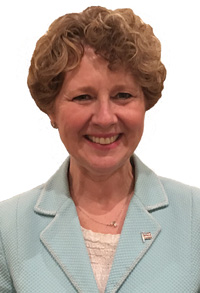This week, Congresswomen Susan W. Brooks (R-Ind.-05) and Debbie Wasserman Schultz (D-Fla.-23) introduced legislation (H.R. 4078) to reauthorize and increase funding for the Breast Cancer Education and Awareness Requires Learning Young Act (EARLY) Act.

Brooks
The earlier that cancer cases are identified, the better the chances are of surviving and overcoming this devastating health challenge. The key to early detection and treatment lies in education, advocacy and research. In 2019 alone, a total of 331,530 new cases of breast cancer, both invasive and non-invasive, are expected to be diagnosed in American women of all ages.1 For young women and women of certain ethnic and racial populations, too often the breast cancer is a more aggressive form and is caught later than it should.
The EARLY Act, which became law in 2010, empowers young and high risk women to understand their bodies and advocate for their health.
“One in eight women in the United States will be diagnosed with breast cancer over their lifetime and 5,820 Hoosier women are expected to be diagnosed with this devastating disease in 2019,” said Brooks. “It is important to reauthorize the EARLY Act because it shines a necessary spotlight on the threats posed by breast cancer to young women. I’m proud to lead this bill with my friend and cancer survivor Congresswoman Wasserman Schultz because it seeks to educate health care professionals and the public about the importance of young women’s breast health and supports research that will help end breast cancer once and for all.”
“Reauthorizing the EARLY Act means that we will continue the vital work of educating young and higher risk women about their breast health and direct their attention to this deadly disease. We must continue supporting initiatives that help identify high-risk women, collect family histories and educate doctors,” said Wasserman Schultz, who was diagnosed with breast cancer and the BRCA2 gene mutation at age 41, and after seven surgeries is now more than a decade cancer-free. “Congresswoman Brooks and I are committed to helping high risk and young women acquire the knowledge and resources they need to not just survive, but thrive.”
This legislation continues access to the health information and resources that are critical throughout a woman’s life. So far, the EARLY Act has created a crucial education and outreach campaign administered by the Centers for Disease Control and Prevention (CDC) that highlights breast cancer risks facing young women and certain women at higher risk due to their ethnic or racial background, while empowering them with the tools they need to fight this disease.
“When I was diagnosed with breast cancer at a young age, I was familiar with how my breasts normally felt, so I knew when something felt different and knew I needed to go to the doctor when I felt an unusual lump,” Wasserman Schultz continued. “This bill provides younger women with those tools to ensure better understanding of their breast health.”
The funds and focus provided by the EARLY Act so far have been crucial to helping the CDC identify gaps in education and awareness among young women and health care providers about breast health, support young survivors through grants to organizations focused on helping them cope with the many unique challenges they face as young women and in implementing a targeted media campaign to reach young and higher risk women.
The EARLY Act is supported by the American College of Radiology, Breast Friends, Bright Pink, FORCE: Facing Our Risk of Cancer Empowered, Living Beyond Breast Cancer, Moffitt Cancer Center, National Black Nurses Association, National Consortium of Breast Centers, National Hispanic Medical Association, Oncology Nursing Society, Prevent Cancer Foundation, Sharsheret, Susan G. Komen, and Tigerlily Foundation.
